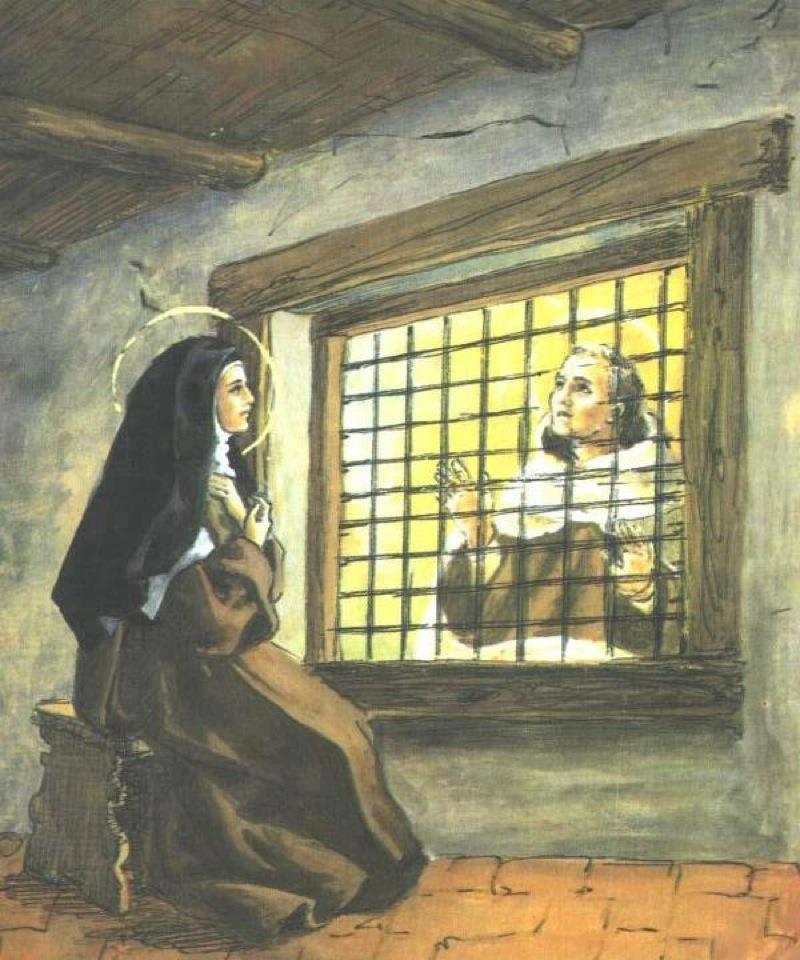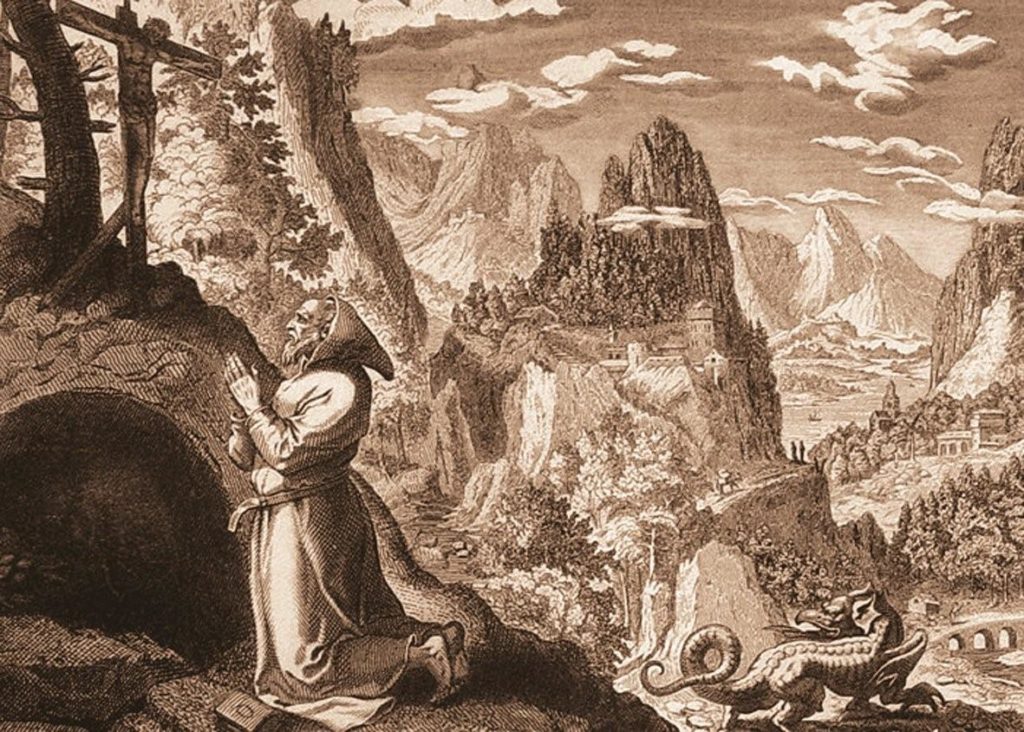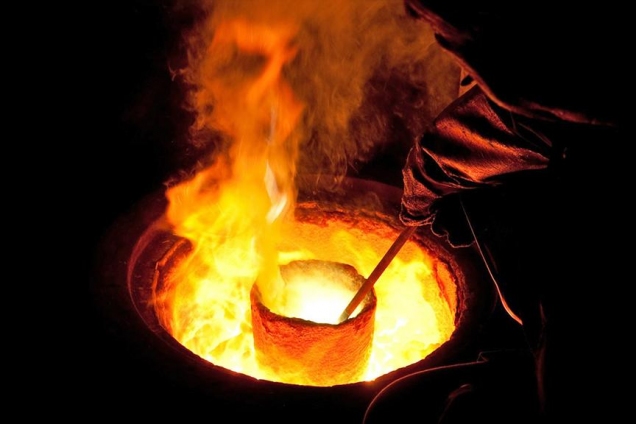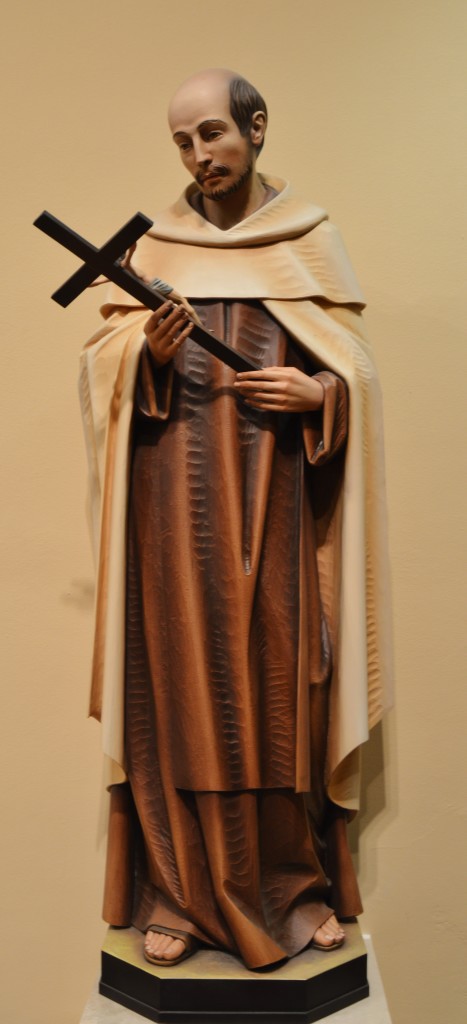Purification
Of the image
Of GOD.
Cleansing the Divine within.
Interior refraction,
Stripping, erasing, removing,
Abolishing presumption.
May HE who is able,
Provide the remedy.
Faithful receiving,
Passive and prayerful.
Obedient.
Doing nothing,
Waiting quietly.
Monthly Archives: July 2017

Two saints applying
A second and more important reason for their (St Teresa of Avila and St John of the Cross) preeminence today is that their method of approach to spiritual theology is already very much the modern scientific method as we know it. Both writers take as their starting point an immense quantity of carefully assembled empirical data. They lived at a time and in a place where there was an immense religious zeal, and when innumerable people applied themselves to the business of the spiritual life. Many more, spurred on by fashion rather than piety to study, and in the course of guiding, directing, and praying for them St Teresa and St John of the Cross, observed them and learnt from them, filling out the wealth of their own personal experience from the temptation and the blessings, the successes and the failings of their fellow countrymen and women. Like the true scientists they were, they collated, classified, and examined in detail the information at their disposal, and wrote their conclusions in treaties which deliberately give a conspectus of the whole field of spiritual theology. Thiers is no haphazard, piecemeal work. They aimed to produce a complete and systemized body of doctrine. It was of the genius of St Teresa to pioneer the method, the crowning glory of St John of the Cross to relate the material to the whole background of dogmatic and moral theology of the Church.
…this was no academic exercise. The saints were surrounded by those who wished to make their way to God. The task before them was that of evolving a practical method of guiding them. –E.W. Trueman Dicken ‘The Crucible of Love: A Study of the Mysticism of St Teresa of Jesus and St John of the Cross’


Combined effort
No one among us can prevail by his own unaided strength over the devices and wiles of the evil one; he can prevail only through the invincible power of Christ. Vainly, therefore, do conceited people wander about claiming that they have abolished sin through their ascetic accomplishments and their free will. Sin is abolished only through the grace of God, for it was made dead through the mystery of the Cross. This is why that luminary of the Church, St. John Chrysostom, says: ‘A man’s readiness and commitment are not enough if he does not enjoy help from above as well; equally help from above is no benefit to us unless there is also commitment and readiness on our part. These two facts are proved by Judas and Peter. For although Judas enjoyed much help, it was of no benefit to him, since he had no desire for it and contributed nothing from himself. But Peter, although willing and ready, fell because he enjoyed no help from above. So holiness is woven of these two strands. Thus I entreat you neither to entrust everything to God and then fall asleep, nor to think, when you are striving diligently, that you will achieve everything by your own efforts. –St Theodoros the Great Ascetic ‘Philokalia’


Mysticism
During the last twenty years there has been a quite astonishing demand among English speaking people for the classics of the spiritual life. It would be rash to draw from that fact any general conclusions as to the state of religion at the present day, for a not too serious curiosity on the part of the reading public concerning all that appears mysterious or occult may easily account for the sales of many ‘mystic’ works. But if this is so, it is a pity. It is true that the spiritual masters can open for us ‘deep caverns of the sense which were dark and blind,’ but they make no offer of a sight-seeing trip at the price in cash of a paper-backed translation. The road where they would lead us is one of self-discipline and self-abnegation, and there is no easy way round. “If any man would come after me, let him deny himself and take up his cross and follow me.” —E.W. Trueman Dicken ‘The Crucible of Love: A Study of the Mysticism of St Teresa of Jesus and St John of the Cross’ copyright 1963.
Crucible: noun 1. a container of metal or refractory material employed for heating substances to high temperatures. 2.
Metallurgy. a hollow area at the bottom of a furnace in which the metal collects. 3. a severe, searching test or trial.


Stricken with night fever in Spain
That night I became ill with a fever. It was an attack of no great consequence, but alarming while it lasted. I tossed on my bed hour after hour in a state between waking and sleeping. The room seemed to be filled with saints looking down at me with supercilious expressions. Saint Ignatius stood by my pillow, wearing black velvet embroidered with gold. Saint Isidro wore a leather jerkin and high boots; a yoke of oxen were at his side. John the Baptist kept changing his appearance with chameleon rapidity, becoming each time more formidable. Then, I seemed to be out of doors, standing under a colonnade in the Plaza Mayor into which a mob was surging from the neighboring streets. There were more people on balconies and at windows. On a platform, raised above the crowd, I saw Philip, the king, in a black doublet and hose. His face had a secretive expression and his hair was pale under his feathered cap. There was a savage roar of voices, then a silence more horrible than the shouting. Those condemned by the Iquisitiors were filing past. They wore the yellow sanbenito painted with tongues of flame, and carried candles in their hands and green crosses. Presently, I was back in my room. Saint John of the Cross was there. He was wearing the white cloak of a Carmelite, and his face bore an expression at once ecstatic and compassionate. I heard over and over again the words:
Oh noche amable mas que el alborada.
O night more lovely than the dawn.
I did not know whether it was he or myself who was saying them. Then, I knew it was myself, and that what I had thought to be his cloak, was the curtain. Through the window I saw the sky streaked with daylight. –‘A Journey in Spain: Saint Teresa’ Elizabeth Hamilton

St John of the Cross. Euclid, Ohio.

Quips from a desert father
Desire that has its origins in the mind is the source of dark passions. And when the soul is engrossed in such desire, she forgets her own nature, that she is the breath of God, and so she is carried away into sin in her folly, not considering the evils that she will suffer after death.
Godlessness and the love of praise are the worst and most incurable disease of the soul and lead to her destruction. The desire for evil signifies a lack of what is good. Goodness consists in doing with all our heart whatever is right and pleasing to the God of all. –St Antony the Great ‘The Philokalia’

Love as prayer
Francisco de Osuna taught that love is within the scope of every human being. So, then, is prayer. For prayer is an act of love. Teresa speaks of prayer as a loving conversation, yet one in which words are not essential. As she well knew, in sickness or distress of mind not only words but thoughts become impossible. Yet, even then, prayer is not excluded. The afflictions, whether of mind or body, become an offering of love. All that is needed is the will to love. Nor are those debarred from prayer whose thoughts are a turmoil of doubts and distractions, like horses that will not be disciplined. No matter how great the turmoil, persons so afflicted, if their will is set upon God, can find in the depths of the soul at a level untouched by the senses a pool of peace. These, moreover, far from being worse off than others who are lifted to the heights of contemplation, are to be envied, sheltered as they are from the temptation to arrogance, from delusion and deception. They love without visible reward for their loving, proving their love in the darkness of humility. They are like the little donkeys that with eyes covered draw the water-wheel, not knowing the service they are doing their master. ‘A Journey in Spain: Saint Teresa’ Elizabeth Hamilton

Storks of Spain



Recent Comments